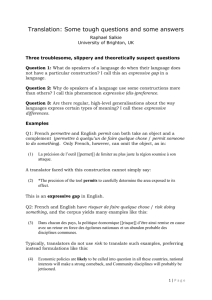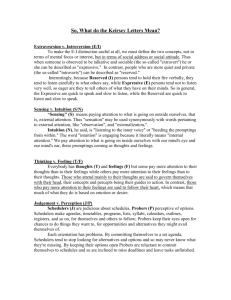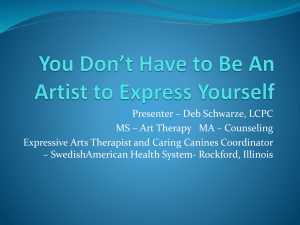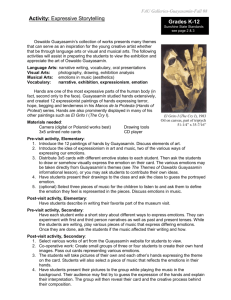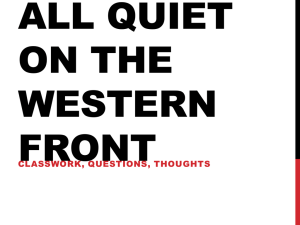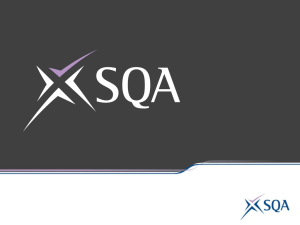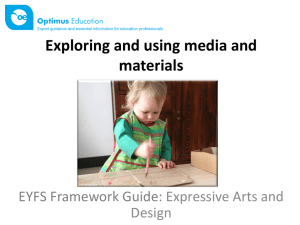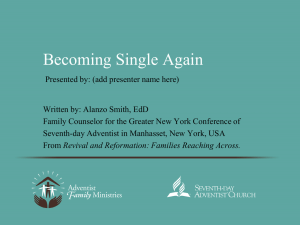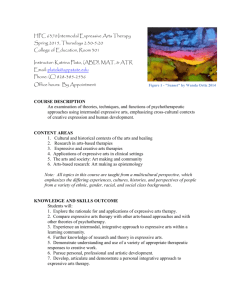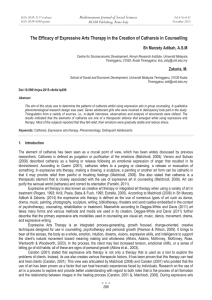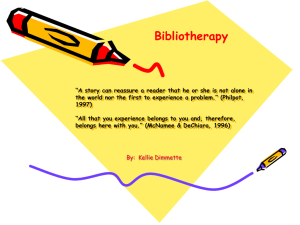Expressive Arts Session
advertisement
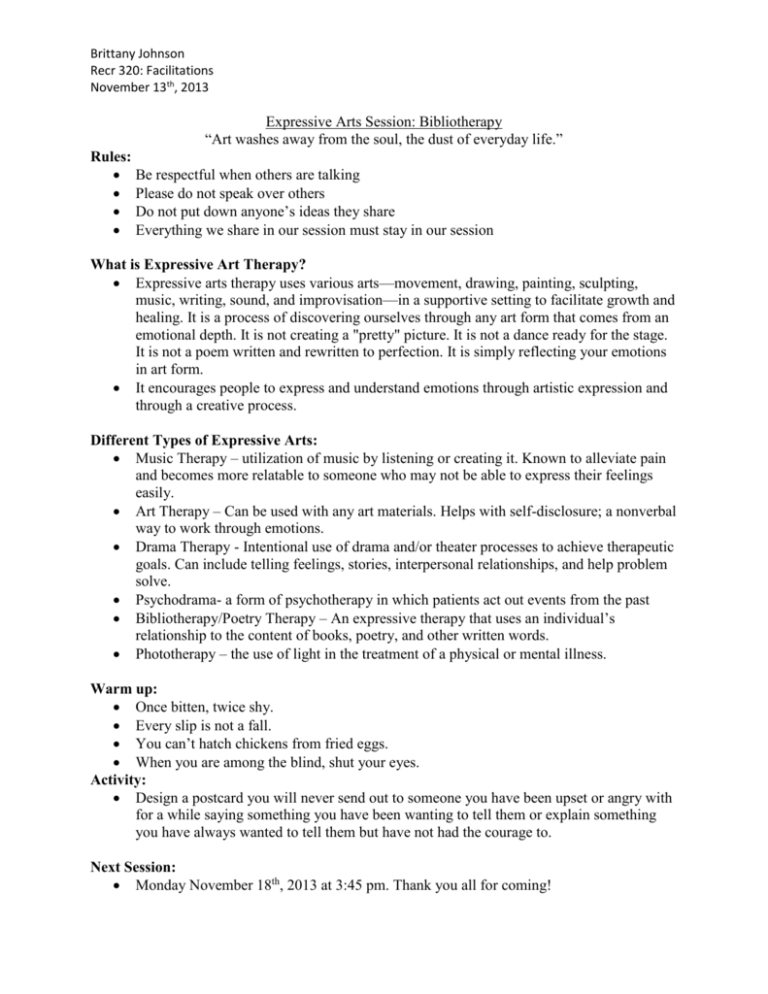
Brittany Johnson Recr 320: Facilitations November 13th, 2013 Expressive Arts Session: Bibliotherapy “Art washes away from the soul, the dust of everyday life.” Rules: Be respectful when others are talking Please do not speak over others Do not put down anyone’s ideas they share Everything we share in our session must stay in our session What is Expressive Art Therapy? Expressive arts therapy uses various arts—movement, drawing, painting, sculpting, music, writing, sound, and improvisation—in a supportive setting to facilitate growth and healing. It is a process of discovering ourselves through any art form that comes from an emotional depth. It is not creating a "pretty" picture. It is not a dance ready for the stage. It is not a poem written and rewritten to perfection. It is simply reflecting your emotions in art form. It encourages people to express and understand emotions through artistic expression and through a creative process. Different Types of Expressive Arts: Music Therapy – utilization of music by listening or creating it. Known to alleviate pain and becomes more relatable to someone who may not be able to express their feelings easily. Art Therapy – Can be used with any art materials. Helps with self-disclosure; a nonverbal way to work through emotions. Drama Therapy - Intentional use of drama and/or theater processes to achieve therapeutic goals. Can include telling feelings, stories, interpersonal relationships, and help problem solve. Psychodrama- a form of psychotherapy in which patients act out events from the past Bibliotherapy/Poetry Therapy – An expressive therapy that uses an individual’s relationship to the content of books, poetry, and other written words. Phototherapy – the use of light in the treatment of a physical or mental illness. Warm up: Once bitten, twice shy. Every slip is not a fall. You can’t hatch chickens from fried eggs. When you are among the blind, shut your eyes. Activity: Design a postcard you will never send out to someone you have been upset or angry with for a while saying something you have been wanting to tell them or explain something you have always wanted to tell them but have not had the courage to. Next Session: Monday November 18th, 2013 at 3:45 pm. Thank you all for coming! Brittany Johnson Recr 320: Facilitations 11/13/2013 Rules: Be respectful when others are talking Please do not speak over others Do not put down anyone’s ideas they share Everything we share in our session must stay in our session What is Expressive Art Therapy? Does anyone know what expressive art therapy is? Expressive arts therapy uses various arts—movement, drawing, painting, sculpting, music, writing, sound, and improvisation—in a supportive setting to facilitate growth and healing. It is a process of discovering ourselves through any art form that comes from an emotional depth. It is not creating a "pretty" picture. It is not a dance ready for the stage. It is not a poem written and rewritten to perfection. It is simply reflecting your emotions in art form. It encourages people to express and understand emotions through artistic expression and through a creative process. Has it impacted your life in anyway? Reflect on the quote at the top of your paper and think about what it means as we go through this session. “Art washes away from the soul, dust from everyday life.” Anyone have a guess to what it means? It means art is used to deal with things such as stress, trauma, or unhappiness. Different Types of Expressive Arts: Music Therapy – utilization of music by listening or creating it. Known to alleviate pain and becomes more relatable to someone who may not be able to express their feelings easily. Art Therapy – Can be used with any art materials. Helps with self-disclosure; a nonverbal way to work through emotions. Drama Therapy - Intentional use of drama and/or theater processes to achieve therapeutic goals. Can include telling feelings, stories, interpersonal relationships, and help problem solve. Psychodrama- a form of psychotherapy in which patients act out events from the past Bibliotherapy/Poetry Therapy – An expressive therapy that uses an individual’s relationship to the content of books, poetry, and other written words. Phototherapy – the use of light in the treatment of a physical or mental illness. We are going to be doing a creative writing assignment or bibliotherapy. The important thing to know about bibliotherapy is there is no right or wrong answer it is truly how you interpret the literature. Warm up: We are going to do a little warm up to get our expressiveness flowing. Listed are some statements we are going to discuss the meanings of. Brittany Johnson Recr 320: Facilitations 11/13/2013 • Once bitten, twice shy. (fear) What do you think that means? One who had an unpleasant experience induces caution. Have any of you had an unpleasant experience that has made you hesitant? • Every slip is not a fall. (relapse) What do you think this statement means? Every time you fail at something or fall down does not mean that you will not get back up or succeed. • You can’t hatch chickens from fried eggs. (past) Does anyone have a guess to what it means to our own lives? You can’t move forward if you are still holding onto the past. • When you are among the blind, shut your eyes. (empathetic feelings) Any ideas to what this means? It means that sometimes we are so quick to judge and make assumptions that we need to put ourselves in others worlds to get a better understanding of things. Can anyone give me an example of something that happened to them? Activity: • Design a postcard you will never send out to someone you have been upset or angry with for a while saying something you have been wanting to tell them or explain something you have always wanted to tell them but have not had the courage to. Debriefing: 1. What was your first impulse when you knew you had to really dig deep in this activity? How do you feel after? 2. How did it make you guys feel to write out something you have always wanted to say? Did you find it easy or hard? 3. Do you think writing it out could maybe get you to confront that person about it now that you know exactly what you want to say? 4. Do you thinking writing is an effective way of expressing feelings and emotions or do you have another way you would have preferred? 5. Do you think using expressive arts will better help us control our emotions and feelings? Expressive arts is important to everyone’s lives because it allows us to escape from reality and confrontation and expressive the emotions and feelings we are bottling up and portraying them in a masterpiece! Next Session: • Monday November 18th, 2013 at 3:45 pm. Thank you all for coming!
